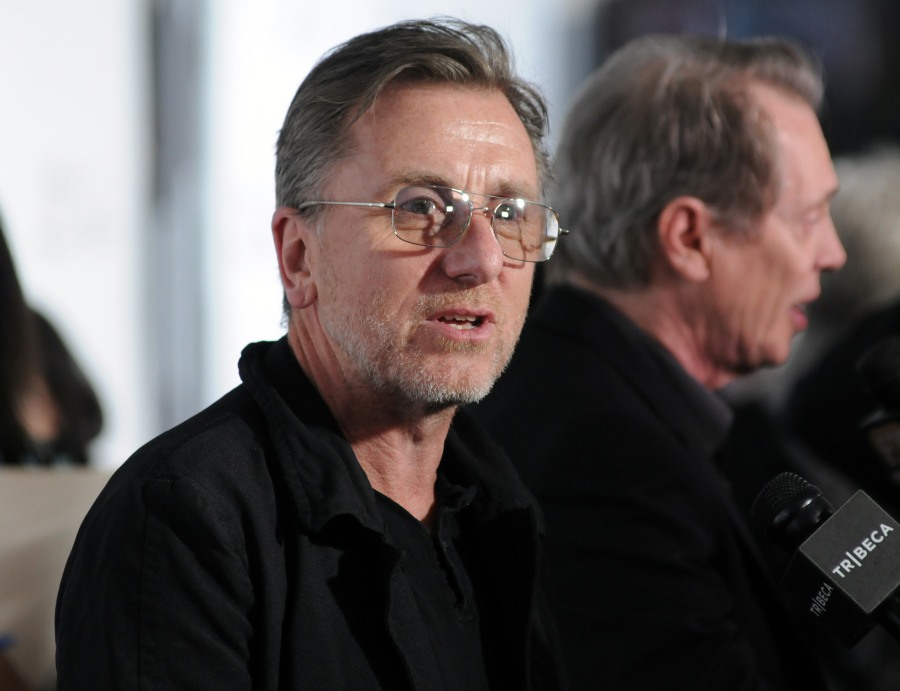I’ve always loved Tim Roth as an actor, but I really didn’t know much about his life until late last year, when I covered a fascinating interview he gave to The Guardian. Roth is a British guy, working class Brit, actually, and he currently lives in LA full-time with his wife and kids. He spent a lot of that interview talking about American politics and Donald Trump and why he prefers living in America. In that Guardian interview, he also talked a lot about how his grandfather had physically abused him and his father (Tim’s father). I didn’t excerpt any of that part of the conversation because frankly it really upset me. Well, here’s an interesting addendum to that part of the conversation – Tim now says that his father, who fought in World War II, changed the family name in an act of solidarity with the Jewish people. Isn’t that interesting?
If you were planning on inviting Tim Roth to your next Passover seder we’re not saying you should reconsider, but you might be surprised to know that his surname aside, the veteran actor is not Jewish. Many have assumed so — just as the British actor’s skill with an American accent has led many to believe he’s American. But if it weren’t for his father changing the family name in 1944, in an act of Jewish solidarity during World War II, the “Reservoir Dogs” actor would be Tim Smith today.
“My dad was from here — he was born in Sheepshead Bay,” Roth told us at the party to celebrate the 25th anniversary of “Reservoir Dogs,” where he was hanging alongside director Quentin Tarantino, producer Harvey Weinstein and co-stars Michael Madsen and Steve Buscemi. “Then he went to Liverpool to work in the factories and rebel against his father, who was an a–hole, and then he joined the Air Force when was underage — 17 I think. And then he saw stuff and took a Jewish name.
“I get invited to tons of Jewish functions which always involve alcohol and food, weirdly. I’m very honored by that. He was a great man. He was a flawed individual but he was a good human, so that would sum him up just for doing that.”
The “a–hole” in question is the grandfather Roth publicly declared in December had abused both him and his father. You might think speaking up about it would be torturous — but on the contrary, Roth said it was “easy.”
“My first conversation about it was with my father. (I thought), well that was pretty easy! So you just carry on from there,” he said. “I think you have to, in the same way that people talk about men’s aggressive behavior towards women.”
A lot of people feel shame about it, we noted.
“Well they shouldn’t. The shame is on the abuser. But it does need some vocal support. It needs to get messy before it can get straight and there’s enough of us out there that can quite easily add our voices and see what happens.”
So Tim’s father is actually American, and I would assume his paternal grandfather is American too. So Tim’s father went to Liverpool to work and to escape his abusive father. Then Tim’s dad ended up joining the Air Force, then he saw the Holocaust first-hand and decided to divorce himself from his abusive father and pledge solidarity with the Jewish people. That’s a really amazing story. Tim Roth: not Jewish, but his dad purposefully selected a Jewish name.
Photos courtesy of WENN.
















Good for you, Tim and good for your Dad, making his own stand.
Is anyone else misty eyed from this? The context of changing the last name is so powerful and beautiful.
I’m floored.
Yes! Fascinating.
A beautiful story
I read his parents were a journalist and a painter/artist. By all accounts he grew up poor yes, middle class no. That being said he is still an incredible actor who I am a fan of.
It is sad that generation of WWII are passing…I remember a boyfriend from school whose father was one of the first liberating Belsen..always nightmares afterwards…
Now you can have the right wing deniers as those that saw it for all the cruelty are elderly or have already passed away..
Shocking and Sad..but I think that is why each generation needs a kick start to fight this and perhaps Trump has provide that?
Love the man. Now I love his father, too.
I heard this story years ago and was very moved by it. Tim has always been thoughtful and articulate, and a great, great actor. I’ve adored him for many years. I wish we saw more of him.
Serious question here, how is this not considered to be cultural appropriation in some way? I know it was his dad’s choice and not his, but say he had changed his name to a stereotypically black south African name in solidarity with the people affected by apartheid (random example), would this still be ok? I’m genuinely asking as am never sure anymore when homage, or appreciation becomes appropriation.
It would have been appropriation if he had been proclaiming to people that he was Jewish. He is not and never has. Same goes to the South African example – if you were a white person, started tanning yourself, put your hair in braids, and called yourself by a tribal name, you’d be appropriating. It’s an intent thing.
It’s also a time thing – language and culture have evolved with time to develop these terms and pinpoint our understanding of vague ideas to this level that we seek to understand what is appreciation, appropriation and what comes in between. Back in 1944, they didn’t have these terms or ideas. So we can look at the past through lens we have developed today and reinterpret those actions.
This makes sense, thanks for explaining it so well.